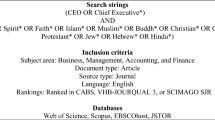Abstract
One challenge that globalization has brought to business is that firms, as they expand their market globally through cross-border alliances, need to deal with partner firms from countries of different religious background. The impact of a country’s dominant religion on its firms’ international market entry mode choices has not been examined in traditional approaches. Focusing on hypothesizing the influence of Christian beliefs and atheism (i.e., the absence of belief in any deities), this research aims to fill the gap by exploring religion’s role in providing moral restraint on managers’ propensity for opportunism, which in turn affects these managers’ choices of their firms’ international market entry via non-equity alliances or joint ventures. A study of 22,156 cross-border alliances formed in 48 industries world-wide over 9 years provides new insight toward understanding religion’s influence on firms’ international market entry mode decisions through the ethical dimension of strategic leadership.
Similar content being viewed by others
Abbreviations
- TCE:
-
Transaction cost economics
- SDC:
-
Security Data Corporation
References
Ali A. J., R. C. Camp and M. Gibbs: 2005, The Concept of ‹Free Agency’ in Monothesistic Religions: Implications for Global Business. Journal of Business Ethics 60(1), 103–112
Anderson E. and A. T. Coughlan: 1987, International Market Entry and Expansion via Independent or Integrated Channels of Distribution. Journal of Marketing 51(1), 71–82
Bakke D.: 1995, Values Don’t Work in Business. In M. L. Stackhouse, D. P. McCann, S. J. Roels and P. N. Williams (eds.), On Moral Business: Classical and Contemporary Resources for Ethics in Economic Life. William B. Eerdmans Publishing Company, Grand Rapids, MI, pp 713–717
Beekun R. and J. A. Badawi: 2005, Balancing Ethical Responsibility among Multiple Organizational Stakeholders: The Islamic Perspective. Journal of Business Ethics 60(2), 131–145
Butts D.: 1999, Spirituality at Work: An Overview. Journal of Organizational Change Management 12(4), 328–331
Calkins M.: 2000, Recovering Religion’s Prophetic Voice for Business Ethics. Journal of Business Ethics 23(4), 339–352
Caza A., B. A. Barker and K. S. Cameron: 2004, Ethics and Ethos: The Buffering and Amplifying Effects of Ethical Behavior and Virtuousness. Journal of Business Ethics 52(2), 169–178
Cheung T. S. and A. Y. King: 2004, Righteousness and Profitableness: The Moral Choices of Contemporary Confucian Entrepreneurs. Journal of Business Ethics 54(3), 245–260
Chun R.: 2005, Ethical Character and Virtue of Organizations: An Empirical Assessment and Strategic Implications. Journal of Business Ethics 57(3), 269–284
Colombo M. G.: 2003, Alliance Form: A Test of the Contractual and Competence Perspectives. Strategic Management Journal 24(12), 1209–1229
The Connecticut Mutual Life Report on American Values in the ‹80’s: The Impact of Belief: 1981, Mutual Life, Hartford, CT
Conroy S. J. and T. L. N. Emerson: 2004, Business Ethics and Religion: Religiosity as a Predictor of Ethical Awareness among Students. Journal of Business Ethics 50(4), 383–396
Contractor F. J. and P. Lorange: 1988, Cooperative Strategies in International Business. Lexington Books, Lexington, MA
Christie P. M. J., I. G. Kwon, P. A. Stoeberl and R. Baumhart: 2003. A Cross-Cultural Comparison of Ethical Attitudes of Business Managers: India, Korea, and the United States. Journal of Business Ethics 46(3), 263–287
Das T. K. and B. Teng: 2000, A Resources-based Theory of Strategic Alliances. Journal of Management 26(1), 31–61
Delbecq A. L.: 1999, Christian Spirituality and Contemporary Business Leadership. Journal of Organizational Change Management 12(4), 345–349
Delios A. and P. Beamish: 2001, Survival and Profitability: The Roles of Experience and Intangible Assets in Foreign Subsidiary Performance. Academy of Management Journal 44(5), 1028–1038
Dirks D. H.: 1988, Moral Development in Christian Higher Education. Journal of Psychology and Theology 16, 324–331
Drennan L. T.: 2004, Ethics, Governance and Risk Management: Lessons from Mirror Group Newspapers and Barings Bank. Journal of Business Ethics 52(3), 257–266
Erramilli M. K. and C. P. Rao: 1993, Service Firms’ International Entry Mode choice: A Modified Transaction Cost Analysis Approach. Journal of Marketing 57(3), 19–38
Ginarte J. C. and W. G. Park: 1997, Determinants of Patent Rights: A Cross-national Study. Research Policy 26(3), 283–301
Gulati R.: 1995, Does Familiarity Breed Trust? The Implications of Repeated Ties for Contractual Choice in Alliances. Academy of Management Journal 38(1), 85–112
Gulati R., N. Nohria and A. Zaheer: 2000, Strategic Networks. Strategic Management Journal 21(3), 203–215
Hennart J.: 1988, A Transaction Cost Theory of Equity Joint Ventures. Strategic Management Journal 9(4), 361–374
Hill C. W. L. and W. C. Kim: 1988, Searching for a Dynamic Theory of the Multinational Enterprise: A Transaction Cost Model. Strategic Management Journal 9(Special Issue, Summer), 93–104
Hofstede G.: 1980, Culture’s Consequences: International Differences in Work-Related Values. Sage Publications, Inc., Beverly Hills, CA
Hunt S. D. and S. J. Vitell: 1993, The General Theory of Marketing Ethics: A Retrospective and Revision. In: N. C. Smith, J. A. Quelch (eds.), Ethics in Marketing. Irwin Inc., Homewood, IL, pp 775–784
Ibrahim N. A. and J. P. Angelidis: 2005, The Long-Term Performance of Small Businesses: Are there Differences between ‹Christian-Based’ Companies and their Secular Counterparts? Journal of Business Ethics 58, 187–193
John G.: 1984, An Empirical Investigation of Some Antecedents of Opportunism in a Marketing Channel. Journal of Marketing Research 21(3), 278–289
Jong G. F. D., J. E. Faulkner and R. H. Warland: 1976, Dimensions of Religiosity Reconsidered: Evidence from a Cross-cultural Study. Social Forces 54(4), 866–889
Kennedy E. J. and L. Lawton: 1998, Religiousness and Business Ethics. Journal of Business Ethics 17(2), 163–175
Killing P. J. 1988 Understanding Alliances: The Role of Task and Organizational Complexity. In F. Contractor, P. Lorange (eds.), Cooperative Strategies in International Business. Lexington Books, Lexington, MA, pp 55–67
Klein S., G. L. Frazier and V. J. Roth: 1990, A Transaction Cost Analysis Model of Channel Integration in International Markets. Journal of Marketing Research 27(2), 196–208
Kogut B. and H. Singh: 1988, The Effect of National Culture on the Choice of Entry Mode. Journal of International Business Studies 19(3), 411–432
Kohlberg L.: 1981, The Philosophy of Moral Development: Moral Stages and the Idea of Justice. Harper & Row, San Francisco, CA
Leiblein M. J. and D. J. Miller: 2003, An Empirical Examination of Transaction- and Firm-level Influences on the Vertical Boundaries of the Firm. Strategic Management Journal 24(9), 839–859
Longenecker J. G., J. A. McKinney and C. W. Moore: 2004, Religious Intensity, Evangelical Christianity, and Business Ethics: An Empirical Study. Journal of Business Ethics 55(4), 373–386
Mascarenhas O. A. J.: 1995, Exonerating Unethical Marketing Executive Behaviors: A Diagnostic Framework. Journal of Marketing 59(April), 43–57
McCann D. P.: 1995, A Word to the Reader. In: M. L. Stackhouse, D. P. McCann, S. J. Roels and P. N. Williams (eds.), On Moral Business: Classical and Contemporary Resources for Ethics in Economic Life. William B. Eerdmans Publishing Company, Grand Rapid, MI, pp 1–9
McCosh A. M.: 1999, Finance Ethics. Kluwer Academic Publishers, Norwell, MA, pp. 87–88
McDonald R. and D. Siegel: 1986, The Value of Waiting to Invest. Quarterly Journal of Economics 101(4), 707–727
McMahon T. F.: 1985, The Contribution of Religious Traditions to Business Ethics. Journal of Business Ethics 4(4), 341–349
McMahon T. F.: 1986, Creed, Cult, Code and Business Ethics. Journal of Business Ethics 5(6), 453–463
Miller J. I.: 1995, How Religious Commitments Shape Corporate Decisions. In M. L. Stackhouse, D. P. McCann, S. J. Roels and P. N. Williams (eds.), On Moral Business: Classical and Contemporary Resources for Ethics in Economic Life. William B. Eerdmans Publishing Company, Grand Rapids, MI, pp. 705–713
Mittelstaedt, J: 1995, ‹Exploring Some Relationships Between Religion and the Marketplace’, in S. L. Grossbart and D. Lascu (eds.), Understanding Change from a Macromarketing Perspective Vol. 20, pp. 8–14
Naisbitt J. and P. Aburdene: 1990, Megatrends 2000. Avon Books, New York
Nooteboom B., H. Berger and N. G. Noorderhaven: 1997, Effects of Trust and Governance on Relational Risk. Academy of Management Journal 40(2), 308–338
O’Fallon M. J. and K. D. Butterfield: 2005, A Review of the Empirical Ethical Decision-Making Literature: 1996–2003. Journal of Business Ethics 59(4), 375–413
Osborn R. N. and C. C. Baughn: 1990, Forms of Interorganizational Governance for Multinational Alliances. Academy of Management Journal 33(3), 509–519
Oxley, J. E.: 1995, ‹International Hybrids: A Transaction Cost Treatment and Empirical Study’, Unpublished Doctoral Dissertation (University of California, Berkeley, CA)
Oxley J. E.: 1999, Institutional Environment and the Mechanisms of Governance: The Impact of Intellectual Property Protection on the Structure of Inter-Firm Alliances. Journal of Economic Behavior and Organizations 38(3), 283–309
Poppo L. and T. Zenger: 1998, Testing Alternative Theories of the Firm: Transaction Cost, Knowledge-based, and Measurement Explanations for Make-or-buy Decisions in Information Services. Strategic Management Journal 19(9), 853–877
Power S. J. and L. L. Lundsten: 2005, Managerial and Other White-Collar Employees’ Perceptions of Ethical Issues in Their Workplaces. Journal of Business Ethics 60(2), 185–193
Rapp R. and R. Rozek: 1990, Benefits and Costs of Intellectual Property Protection in Developing Countries. Journal of World Trade 24(2), 75–102
Robinson, D.: 2001, ‹Strategic Alliances and the Boundaries of the Firm’, Working paper, University␣of␣Chicago Graduate School of Business, Chicago,␣IL
Singhapakdi A., J. K. Marta, K. C. Rallapalli and C. P. Rao: 2000, Toward an Understanding of Religiousness and Marketing Ethics: An Empirical Study. Journal of Business Ethics 27(4), 305–319
Smith A.: 1976, The Theory of Moral Sentiments. Liberty Fund, Inc., Indianapolis, IN, based on original publication in 1759
Sparks J. R. and S. D. Hunt: 1998, Marketing Researcher Ethical Sensitivity: Conceptualization, Measurement, and Exploratory Investigation. Journal of Marketing 62(2), 92–109
Stackhouse M. L.: 1995, The Ten Commandments: Economic Implications. In: M. L. Stackhouse, D. P. McCann, S. J. Roels and P. N. Williams (eds) On Moral Business: Classical and Contemporary Resources for Ethics in Economic Life. William B. Eerdmans Publishing Company, Grand Rapids, MI, pp 59–62
Stassen G.: 1977, A Social Theory Model for Religious Social Ethics. Journal of Religious Ethics 5(1), 9–37
Stevens B.: 2004, The Ethics of the US Business Executive: A Study of Perceptions. Journal of Business Ethics 54(2), 163–171
Tallman S. B. and O. Shenkar: 1994, A Managerial Decision Model of International Cooperative Venture Formation. Journal of International Business Studies 25(1), 91–113
Tsalikis J. and D. J. Fritzsche: 1989, Business Ethics: A Literature Review with a Focus on Marketing Ethics. Journal of Business Ethics 8(9), 695–743
Weaver G. R., B. R. Agle: 2002, Religiosity and Ethical Behavior in Organizations: A Symbolic Interactionist Perspective. Academy of Management Review 27(1), 77–97
Williamson O. E.: 1975, Markets and Hierarchies: Analysis and Antitrust Implications. The Free Press, New York
Williamson O. E.: 1979, Transaction Costs Economics: The Governance of Contractual Relationships. Journal of Law and Economics 22(2), 223–261
Williamson O. E.: 1981, The Economics of Organization: The Transaction Cost Approach. American Journal of Sociology 87(3), 548–577
Williamson O. E.: 1985, The Economic Institutions of Capitalism. The Free Press, New York
Williamson O. E.: 1991, Comparative Economic Organization: The Analysis of Discrete Structural Alternatives. Administrative Science Quarterly 36(2), 269–296
Wines W. A. and N. K. Napier: 1992, Toward an Understanding of Cross-cultural Ethics: A Tentative Model. Journal of Business Ethics 11(11), 831–841
Worden S.: 2005, Religion in Strategic Leadership: A Positivistic, Normative/Theological, and Strategic Analysis. Journal of Business Ethics 57(3), 221–239
Yetmar S. A. and K. K. Eastman: 2000, Tax Practitioners’ Ethical Sensitivity: A Model and Empirical Examination. Journal of Business Ethics 26(4), 271–288
Zhao H., Y. Luo and T. Suh: 2004, Transaction Cost Determinants and Ownership-based Entry Mode Choice: A Meta-analysis Review. Journal of International Business Studies 35(6), 524–544
Zinbarg E. D. 2001, Faith, Morals, and Money: What the World’s Great Religions Tell Us about Ethics in the Marketplace. The Continuum International Publishing Group, New York, NY
Author information
Authors and Affiliations
Corresponding author
Additional information
This article would fit best under the International Management section for reviewing purposes.
Rights and permissions
About this article
Cite this article
Li, N. Religion, Opportunism, and International Market Entry Via Non-Equity Alliances or Joint Ventures. J Bus Ethics 80, 771–789 (2008). https://doi.org/10.1007/s10551-007-9468-3
Received:
Accepted:
Published:
Issue Date:
DOI: https://doi.org/10.1007/s10551-007-9468-3




